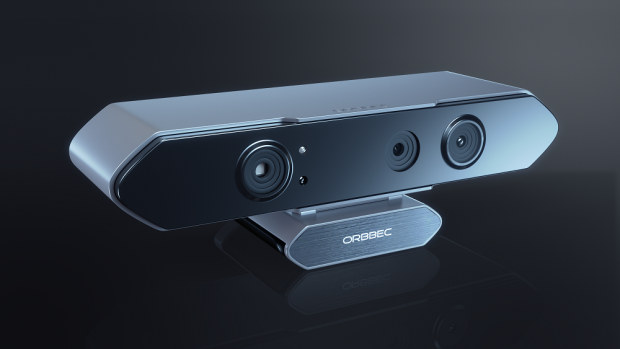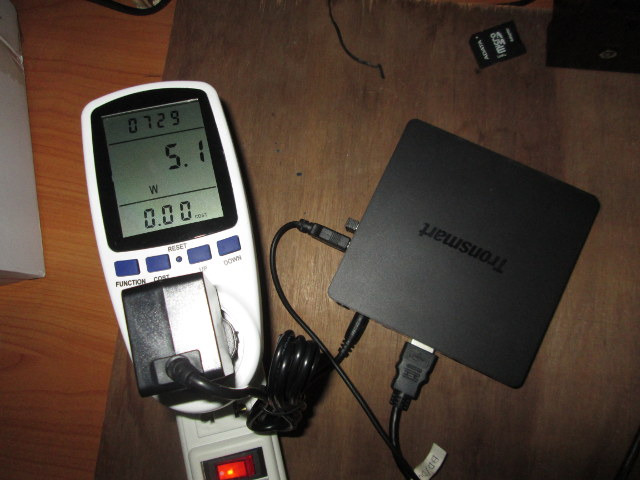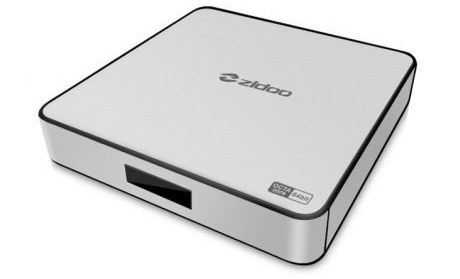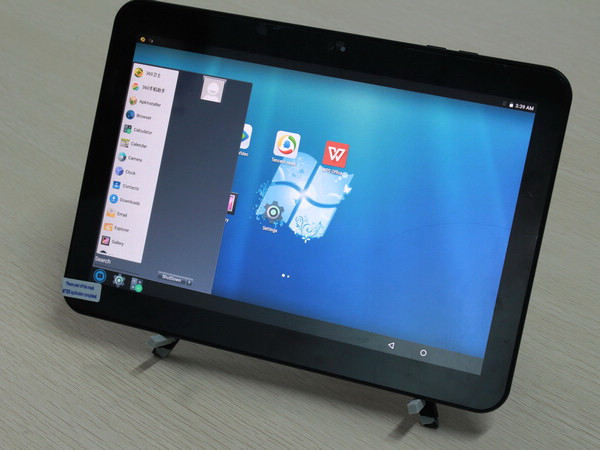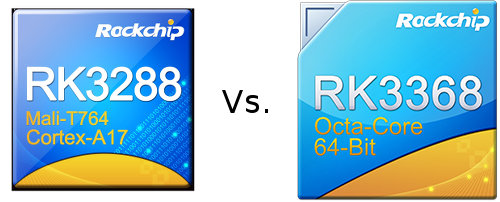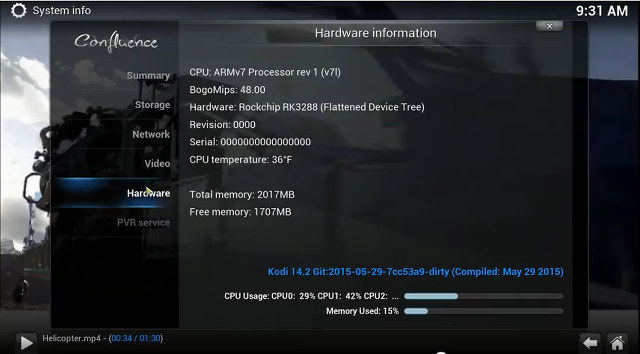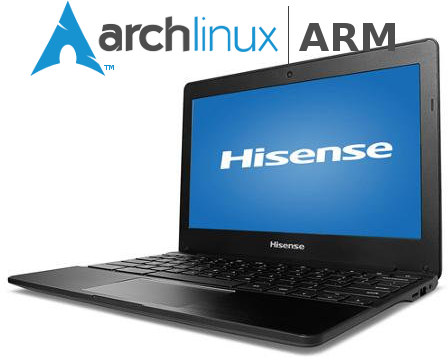Orbbec is a startup working on 3D cameras which can be used for gesture recognition, 3D scanning, research purpose, and more. The company has now embedded their Astra 3D sensor into an ARM based mini PC running Android and/or Ubuntu which they call Orbbec Persee. Persee hardware specifications: SoC – Quad core Cortex A17 processor up to 1.8GHz with a Mali-T7xx GPU @ 600 MHz (They did not name it, but it must be Rockchip RK3288) System Memory – 2GB DDR3 Storage – 16GB eMMC flash, 1x micro SD card slot up to 64GB Video & Audio Output – HDMI 2.0 Audio Input – 2x microphones Camera – Built-in Astra Pro 3D camera RGB image size – 1280×720 @ 30 fps (UVC support) Depth image size – 640×480 @ 30 fps (16-bit) Range – 0.4 to 8 meters Depth accuracy – 0.5 centimeters at 2 meters Field of view – […]
A Look at Android and Windows Mini PCs’ Power Consumption in Power Off, Standby, Idle, and Video Playback Modes
I’ve previously measured power consumption of Amlogic S812 and Rockchip RK3288 based TV boxes using a multimeter. This provides relatively accurate measurements, as well as neat power consumption profiles of devices, but it’s a little complex and time-consuming, so it’s not something I would do for all devices. The easiest way to measure power consumption is to use a kill-a-watt type of device, but my first one broke after only 3 months last year. I purchased a new one recently, so I run run some power measurement tests on several devices. I selected five devices for this test: MeLE PCG01 HDMI stick with Intel Atom Z3735F processor running Windows 10 Zidoo X9 TV box with Mstar MSO9810 running Android 4.4 Open Hour Chameleon TV box with Rockchip RK3288 processor running Android 4.4 Tronsmart Orion R68 Meta TV box with Rockchip RK3368 processor running Android 5.1 Tronfy MXIV TV box with […]
Zidoo X6 Pro Android TV Box To Support 4K Videos @ 60 fps, 7.1 Channels Audio Pass-through, and 3D Blu-ray Movies
With their X9 and X1 models, Zidoo selected entry-level hardware, but their latest Zidoo X6 Pro Android TV box, the company went up to mid-range devices with a Rockchip RK3368 octa-core 64-bit processor, 2GB RAM, 16GB eMMC, Gigabit Ethernet, and 802.11ac WiFi. Zidoo X6 Pro technical specifications: SoC – Rockchip RK3368 octa core Cortex A53 processor @ 1.5GHz (or is it 1.2GHz?) with PowerVR G6110 GPU System Memory- 2GB DDR3 Storage – 16GB flash (Meta). micro SD card slot up to 32GB Video Output – HDMI 2.0 up to 4K @ 60Hz with CEC and7.1CH pass-through support, 3.5mm AV jack (Composite shared with stereo audio) Audio Output – HDMI, AV (stereo), optical S/PDIF Connectivity – Gigabit Ethernet, 802.11 a/b/g/n + 802.11ac (AP6335 module), Bluetooth 4.0 USB – 2x USB 2.0 ports (including one that supports OTG) Misc – Power button, IR receiver Power Supply – 5V/2A Dimensions – 10.8 x […]
Linux 4.2 Release – Main Changes, ARM and MIPS Architectures
Linus Torvalds released Linux Kernel 4.2 last Sunday: So judging by how little happened this week, it wouldn’t have been a mistake to release 4.2 last week after all, but hey, there’s certainly a few fixes here, and it’s not like delaying 4.2 for a week should have caused any problems either. So here it is, and the merge window for 4.3 is now open. I already have a few pending early pull requests, but as usual I’ll start processing them tomorrow and give the release some time to actually sit. The shortlog from rc8 is tiny, and appended. The patch is pretty tiny too. Go get it, Linus Some notable changes made to Linux 4.2 include: File systems New features for F2FS including per file encryption CIFS support SMB 3.1.1 (experimental) Cryptography – Jitter Entropy Random Number Generator, Chacha20 stream cipher and Poly1305 authentication (RFC7539),New RSA implementation. See lwn.net […]
Rockchip’s Light Work OS Makes Android Look Like Windows
Android is not exactly great to use as a desktop PC, so there’s been various attempts to improve this for Android boxes, tablets, and laptops for example with Remix OS, bringing a more desktop-like user experience. Rockchip showcased multi-window supports in some tablets a while ago, and now they have “Light Work OS”, an operating system based on Android 5.1 that feature a start menu and multiple windows support. PiPo even decided to use a background image with Windows logo in their PiPo X9 tablet powered by Rockchip RK3288. The problem with Android used as a mini PC goes much further than the lack start menu or window mode, but copy/paste can be a pain, and things you take for granted on desktop, simply may not be available in Android apps: some graphics elements may not be clickable, some website features may not work properly (I’m thinking WordPress editing here..), […]
Rockchip RK3288 vs RK3368 Benchmarks Comparison
Rockchip RK3368 TV boxes are now shipping, and I’ve just reviewed Beelink i68, so it’s a good time to compare the latest octa-core Cortex A53 processor with its predecessor, RK3288, featuring four ARM Cortex A17 cores, as well as a Mali-T764 GPU. To compare both processors, I’ve used Antutu 5.x, Vellamo 3.x and 3DMark Ice Storm Extreme benchmarks results for Beelink i68 (RK3368) and Tronsmart Orion R28 (RK3288). The ratio divides the scores, and a ratio greater than 1 indicates RK3368 outperforms RK3288. Rockchip RK3288 Rockchip RK3368 Ratio CPU Quad core Cortex A17 @ 1.8 GHz Octa core Cortex A53 @ 1.2GHz GPU ARM Mali-T764 PowerVR G6110 Antutu 5.x Overall 36865 34171 0.93 Multitask 5753 4041 0.70 Runtime 1976 2949 1.49 RAM Ops 2475 2346 0.95 RAM Speed 3153 2601 0.82 CPU Integer (multi-thread) 2433 2973 1.22 CPU float-point (multi-thread) 3565 2930 0.82 CPU Integer (single thread) 1432 1536 1.07 […]
Kodi 14.2 Linux Ported to Rockchip RK3288 with VPU Hardware Decoding
Rockchip RK3288 is one of the most popular platforms for TV boxes, and while most boxes are sold with Android OS, it can also run various Linux distributions with two main caveats: 2D/3D GPU acceleration, and hardware video decoding by the VPU. It appears the last two have been worked on, as yesterday, I got tipped that Kodi 14.2 Linux was running on Ugoos UT3 and Radxa Rock2 Square. Since both hardware platforms showcased a Kodi port at the about same time, it’s probably safe to assume they use the same implementation (despite slightly different build dates May 29 vs June 6), which has been developed by “Marc” (or is it MAC?) using the Android libraries and libhybris for video decoding, raw2 device driver for 2D HW accelerated blitting and converting frames, and ARM OpenGL library, driver and examples, among other software packages. So let’s check the demos starting with […]
Arch Linux ARM Can Now Be Installed on Rockchip Based Hisense Chromebook
Hisense Chromebook C11 is one of the $149 Chromebooks powered by Rockchip RK3288 processor recently launched. So far, I could not find instructions to install any Linux desktop distributions on this type of platform, but now Hisense Chromebook (codename: veyron_jerry) appears to be the first Rockchip platform officially supported by Arch Linux ARM (ALARM). Hardware video decoding won’t work, 3D graphics acceleration is most probably not working either, and it’s not clear if all hardware parts are supported, and the built-in wireless module is said to break under high throughput, so a USB WiFi dongle or Ethernet adapter is recommended instead. But at least if you follow the installation instructions, you won’t modify your Chrome OS installation on the eMMC flash, as Arch Linux ARM will boot from external storage, either from an SD card or a USB flash drive, so it should be completely safe to try it out. […]


